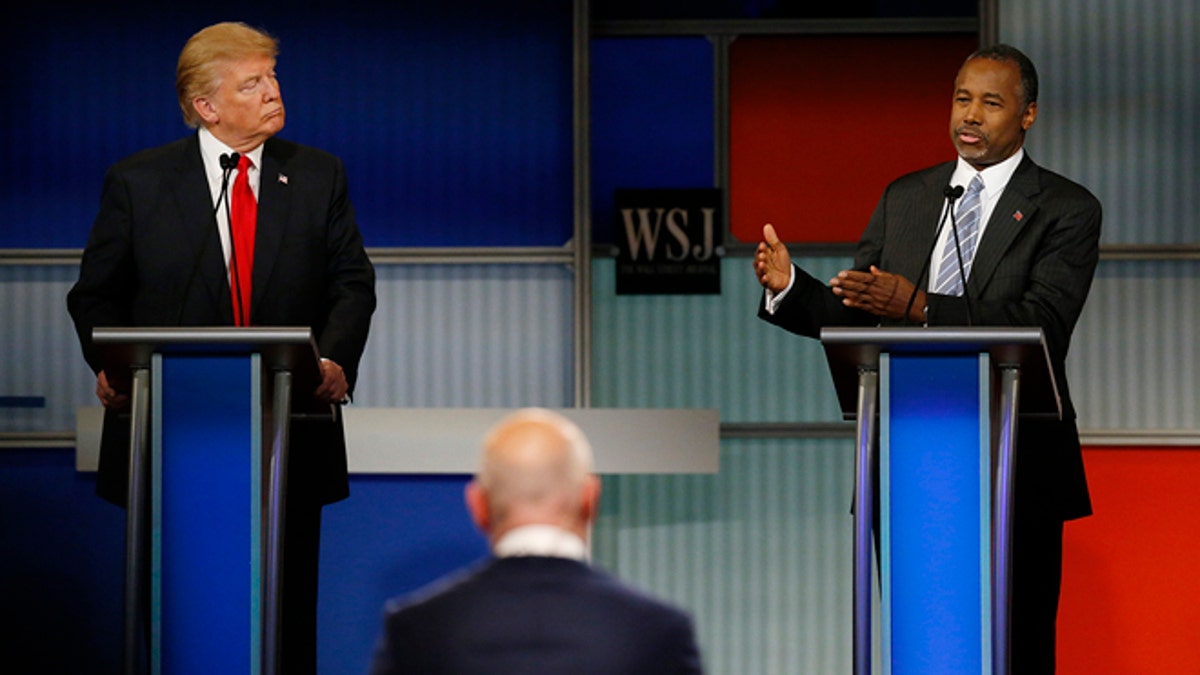
November 10, 2015: Republican U.S. presidential candidate businessman Donald Trump (L) listens as rival candidate Dr. Ben Carson speaks during the debate held by Fox Business Network for the top 2016 U.S. Republican presidential candidates in Milwaukee, Wisconsin. (REUTERS/Jim Young)
We’re certainly on our way to a winning debate format.
Tuesday night’s Republican debate was the first of four to feature less than 10 candidates – and it made a difference. A big one.
Each of the candidates on stage had a shining moment or two; there won’t be any dramatic changes in the standings. And the candidates really focused on Hillary Clinton more than each other. This wasn’t a debate about attacking one another, but instead one about ideas.
Rubio had another hugely strong night. He touted the importance of investing in vocational training to get Americans back to work – a theme both Democrats and Republicans should be emphasizing. He shared his vision of a strong American foreign policy where we recognize Putin as the “gangster” he is and support our allies, especially Israel.
To my mind, Trump showed the greatest depth on the economy and with a majority of Republicans reporting that they trust him to manage the economy, there can be no doubt that he did them proud.
He still has the most forward looking perspective on the future of the country and with his fresh face and attitude, his candidacy is apt to resonate. His message remains the most inclusive, something the GOP desperately needs.
Trump showed a calmer side to his candidacy while still passionately defending his immigration stance, foreign policy rooted in the notion that we can’t be the world’s policeman but still need to build up our military, and demonstrable understanding of the tax code.
To my mind, Trump showed the greatest depth on the economy and with a majority of Republicans reporting that they trust him to manage the economy, there can be no doubt that he did them proud.
Carson showed himself to be out of his depth on questions relating to the economy. It’s not altogether clear where he stands – he flip-flopped on raising the minimum wage in his first answer – and he was most compelling when he talked about his own experience with the media, not his policies.
Still, Carson has the right tone and voters, especially Evangelicals, like him and that’s not going to change.
Fiorina was once again an incredibly strong debater, holding her own and then some. She has clear proposals on how to fix the economy (she laid out a five-point plan in her first answer) and what she would do to address foreign policy crises in Ukraine, Syria and China, rebuild our military and negotiate from a position of power.
Ted Cruz had some of the most memorable lines of the night when he said that the Republicans can’t join the Democrats in being the party of amnesty and that he can’t stand those who say he’s anti-immigrant because he’s not – he’s anti-amnesty.
He showed a naivete in suggesting he wouldn’t bail out the banks and wants to dismantle five government agencies. In this way he fed red meat to the right, but made himself less likely to be elected in a general election.
Kasich at times battled to be part of the conversation, but did a good job in touting his record and the realities of governing successfully. He was reasonable and moderate, which doesn’t necessarily make him an appealing primary candidate though a stronger general election candidate.
It remains to be seen whether Americans will ever take real notice of him.
For once, Rand Paul may have had the most memorable line of the night when he called out Trump on China not being part of the TPP trade deal he was maligning. He was strong in the areas he has been known to emphasize: isolationism and the flat tax. In a field where many Republican candidates are supportive of a flat tax, Paul did the best in explaining how his plan works and why it’s better for the wealthy and the poor alike.
Jeb Bush really had to perform Tuesday night (again) and while he didn’t hurt himself, it’s not clear that he helped his cause at all. Bush didn’t have any great lines or takeaway messages and showed why he’s fallen to fifth place bringing in merely 4 percent of the vote in recent polling.
It remains to be seen whether he can break out and live up to what many saw as great potential.
This debate was a much more level playing field. The Fox Business and Wall Street Journal hosts monitored the candidates’ timing closely and pushed them with follow-up questions when they deflected them, which was often. This approach, combined with having fewer candidates on stage, made for a more policy oriented debate where we got more substance than talking points. It was edifying all around.
All this is to say that new polling won’t show much change in the field, but we know a lot more about where the candidates stand on the issues. The Fox Business moderators made sure that happened and we’re all in their debt for this.
